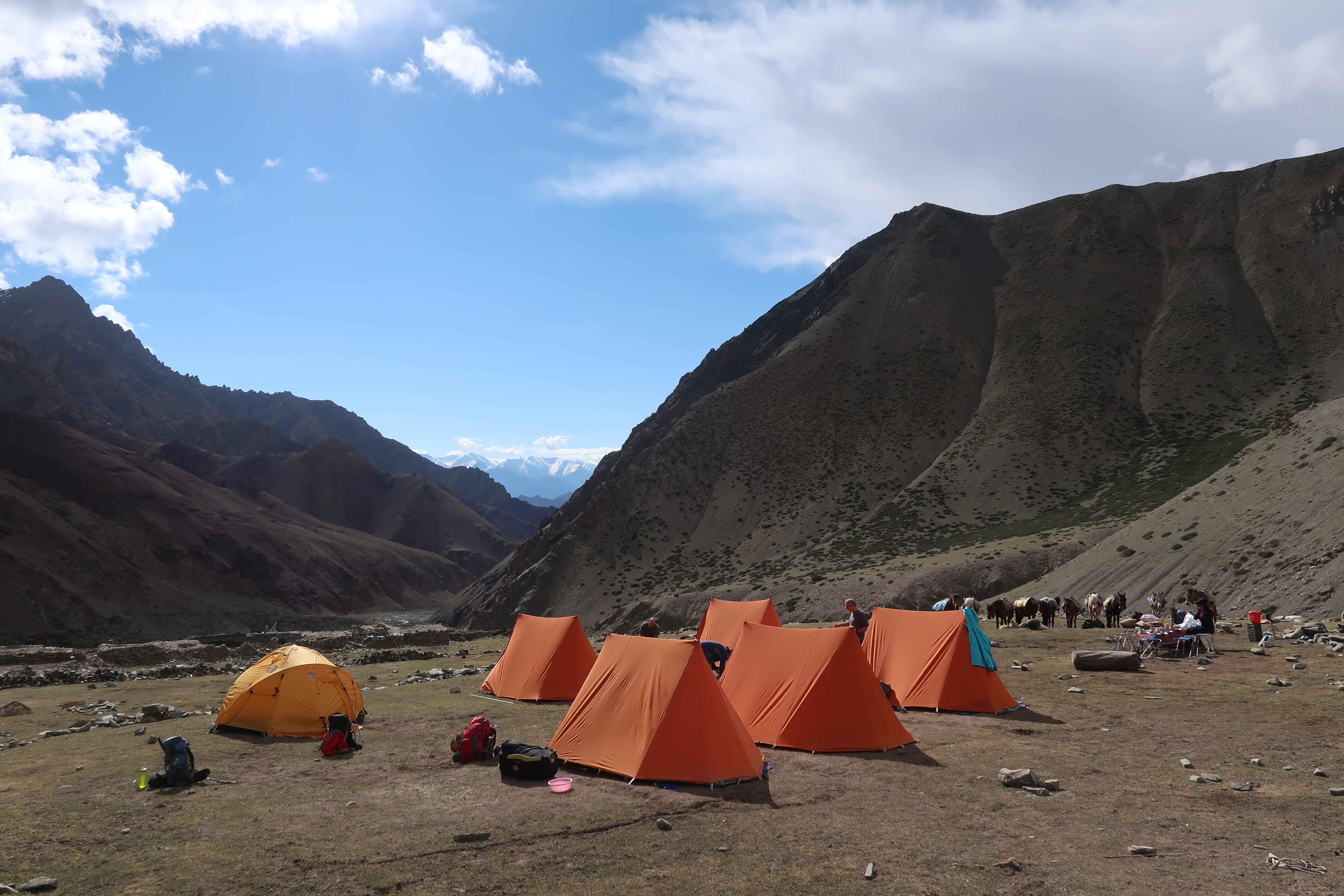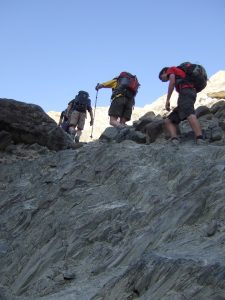Relevant expedition medical skills and experience are vital but what other capabilities and qualities does an expedition medic need to do their job effectively?
Earlier this year, the Faculty of Pre-Hospital Care at The Royal College of Surgeons of Edinburgh produced a document titled ‘Updated Guidance for Medical Provision for Wilderness Medicine’. This guidance is essential reading for any aspiring or established expedition medic (from first aider to senior doctor) as it provides a benchmark for required skills. The document not only describes the clinical skills needed, it also provides some guidance on required skills and experience for the other areas of an expedition medic’s role. It’s this last area that I wanted to explore and to do so, I wanted to hear from the people who work closely with the medic and ultimately lead the expedition.
After hearing Jo Bradshaw’s excellent talk at the recent World Extreme Medicine (virtual) Conference about “why being technically brilliant isn’t (good) enough”, I wanted to delve further into this subject and see if I could find any patterns amongst expedition leaders in what they want from an expedition medic. This article, while celebrating the fantastic work that expeditions medics do, is designed to address where we can improve our service, from the perspective of those at the sharp end of that provision – our expedition leaders! So medical skills and knowledge aside, what other capabilities, qualities and experience does an expedition leader want the expedition medic to have?
I’ve spoken to some of the most incredible expedition leaders that I’ve had the pleasure of working with in the last few years, as well as reaching out to other experienced leaders who have worked alongside medics in all corners of the globe. From Everest summit guides, to leaders taking kids to the jungles of Borneo, UK mountain rescue team members and mountain leaders on Kilimanjaro. Over twenty outdoor professionals who have worked together with mountain medics have kindly given me their advice, opinions and top tips on what they want and need from their expedition medic. I am pleased to report that the general feeling was that having a medic provided a positive addition to an expedition team, especially at high altitude or in polar environments.

I have ordered the leader’s responses starting with the most common answers:
- There is no substitute for expedition experience. Whether it is mountains, jungle, sea or desert, this was the most common theme I heard and the most important point for many. Whatever environment your expedition is in, if you have never been anywhere like it before and never looked after yourself in similar conditions, not only may you personally struggle with the challenge and require help yourself, but you are unlikely to be able to provide high quality health care for your team. Don’t become a hinderance rather than a help. This also goes for travel to developing countries – get some experience before you sign up as the responsible medic on an expedition to a developing area. Wherever you’re going, you must be within your comfort zone (or just slightly stretched) in order to perform well if something goes wrong. Having said this, you don’t need to be as slick as the guide or leader with the technical stuff such as rope work, climbing ability (if relevant) etc. but you do need to be comfortable with it and not be a first timer. A big bonus is if the medic has excellent skills for the expedition terrain and can work as a second leader on more technical terrain to help support the leader and the clients.
- Personal Admin. Being organised and having your expedition ‘personal admin’ down to a fine art is key. Again, the specifics of this depend on the details of the expedition you’re on, but practice and experience is vital. Don’t be the medic who everyone has to wait for because you’ve not packed your bag in time.
- Be honest and be human. Honesty is required for all aspects of the expedition and between all members – be honest with the clients/pax, be honest with the leader and the rest of the team, and be honest with yourself about how you’re feeling. Be human and approachable to gain the team’s trust. Lots of clients on treks or climbs are anxious that if they have a medical issue the medic will stop them from continuing the expedition. Front load information in briefings to explain that you’re there to support them and will only turn people back in extreme situations, after trying hard not too. You need to make clients feel they can tell you about small issues so you can help ensure they don’t become serious problems.
- Teamwork, trust and respect of the whole crew are absolutely essential. You’re together for extended time periods, often in remote areas with no backup so get to know each other and work together. Find out about and then respect the skills and experience of others, especially the leader who may have more first aid experience or terrain specific medical experience than you. Be willing to ask for and accept advice and acknowledge someone else’s expertise.
- Look after yourself especially your mental health. Expeditions are hard and having a routine for some personal time each day is vital. In the same vein, don’t over work – encourage the clients/pax to self manage small issues and don’t try to take on too many of the leader’s roles because although you may be trying to help, you’re just tiring yourself out unnecessarily.
- Communicate clearly at all times. On expedition this is even more important than in a hospital setting as everything changes constantly. You may be working with new people, in new surroundings, with limited resources and in difficult environmental conditions. It is helpful to check in with every team member at least daily to see how they’re doing and if there are any issues they are struggling with. Similarly, check in with the expedition leader regularly to update them on anything relevant e.g. anyone you’re concerned about and vice versa. Be allies for each other. In an emergency situation ensure you clearly express how urgent or severe the situation is and make it clear what you need the leader to help with or organise e.g. do you think the casualty could be helped to walk or do you need to organise a rescue if possible?
- No free riding. Do not come on an expedition with the attitude of being there for a ‘free ride’, e.g. appearing that you’re only there to complete the trek whilst considering your medical role as secondary. Obviously anyone that works on an expedition loves the opportunity to work in amazing places and do amazing things, but make sure you’ve got your priorities in the correct order because if you don’t, the leader and your clients will see straight through you. It can also be very hard work being an expedition doctor so be prepared that it won’t be a free ride at all. Luckily the role is extremely rewarding and an incredible way to experience expeditions from another angle.
- Remember you’re not in charge. The expedition doctor is undoubtedly an important part of the expedition leadership team but you’re not in charge. You are there to contribute your medical expertise and although you may have group management skills too, this is not your role on the expedition and the expedition leader likely has far more experience and skill in this area in the context of the expedition. Support each other but don’t try to take charge.
- The leader and medic should have two distinct roles. Similar to point eight, the leader and medic should help each other in busy times but if a client asks you about specifics of the itinerary or group management question direct them to the expedition leader. Sadly, there is still sexism in the expedition world and I have heard examples of some clients looking to a male team doctor rather than to their female expedition leader to answer questions regarding things like expedition logistics. A positive way to approach such issues is to direct questions to the correct person and explain that the leadership team have different roles relating to their expertise.
- Meet or call the expedition leader in advance of the trip if possible. Find out about each other’s experience, what you’re both expecting from the expedition and from each other, and discuss your specific roles. Make a plan of how you can best work together. Plan who will cover which topics in any briefings to ensure nothing is missed. Discuss protocols for emergencies and evacuations.
- Be proactive and get involved in all aspects of expedition life. You’ve got a job to do but that doesn’t mean you can’t have fun too! Be part of the team, get to know the clients and the locals.
- No drama please – don’t over medicalise everything. Use common sense and try simple solutions first. If an expedition has no medical issues and no major problems it’s a good thing!
- Know your medical kit, especially if you haven’t put it together. Know where to find things, check supply quantities, check things works etc. It looks unprofessional if you don’t know where things are or even what you’ve got with you in front of a client. Also know the limitations of your kit such as oxygen saturation probes not working in very cold conditions.
- Documentation. After checking company guidelines first regarding confidential information sharing, give copies of incident notes to the expedition leader at the end of a trip to ensure they have proof everything was done correctly. Ask for copies of theirs too.
- Don’t flap, remain calm, and ask for help when needed.

I would like to think that none of the above points come as a huge surprise to most expedition medics, but there is still lots to be learnt and reflected upon and I’ve certainly taken something away from compiling this information, especially when hearing the same key points coming up time and again (the first eight points). I absolutely agree with the expedition leaders that being expedition competent is the number one requirement as the medic; it is fundamental and critical to working well and enjoying it. This is agreed as by the Royal College of Surgeons guidelines which state that “as in all healthcare practice, it is the medic’s responsibility for ensuring they are adequately competent to deal with the associated situations” and that “You must be certain the demands of the trip fall within your competency and skill level, both clinical and the activities you will be undertaking on expedition.” If there is one take home point for aspiring expedition medics, this must be it.
I am very grateful to all the expedition leaders who contributed and took the time to answer my questions and help me gather this information – a huge thanks for your input! To all aspiring expedition medics, good luck and enjoy it!
A later blog post will discuss the role and responsibilities of an expedition medic and will go into more detail about the specific medical competencies required.
As always please feel free to leave any comments or questions and share the blog with anyone you think may find it interesting or useful. Thank you.

This has come together nicely 😊
Thanks very much Allan!
Hannah, some good areas for reflection there and thank you for pulling this all together. All I need to do is retire and see if expeditions will trust a dentist in the exped medic role!
Hi Alun, thank you. Lots of expeditions love to have a dentist on the team (especially longer and more remote expeds)! I’ve had the pleasure of being taught some emergency dentistry skills for expeditions by Burjor Langdana on a couple of occasions, he’s an amazing guy and worth looking up if you don’t know him.
Pingback: The Role Of Expedition Medic: What It Really Involves - Dr. Hannah Lock